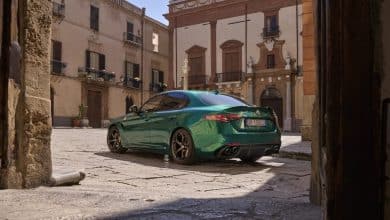Nissan and Honda explore a “strategic partnership” in electric

(Tokyo) Japanese car manufacturers Nissan and Honda, two fierce historical rivals, confirmed on Friday that they are considering a “strategic partnership” in electricity and software, enormous challenges that they have in common and where the union can make strength.
They will initially launch a feasibility study on their prospects for collaboration in automotive software platforms, key components for electric vehicles (such as batteries for example) and other complementary products, according to a press release.
“Our industry is at a significant turning point” with the arrival of “new players” in addition to historic car manufacturers, recalled Nissan CEO Makoto Uchida during a press conference in Tokyo with his counterpart at Honda. , Toshihiro Mibe.
“These emerging brands, with innovative products and new business models, are breaking into the automotive market and seeking to become dominant by capitalizing on their overwhelming price competitiveness and extraordinary speed,” added Mr. Uchida, in a barely veiled allusion to Chinese electric manufacturers.
“We cannot win this race by keeping a traditional approach,” he added.
The possible cooperation between the two groups must establish “a win-win relationship, this is the starting condition,” declared Mr. Mibe. But “nothing has been decided for the moment,” he said.
The shares of the two groups rose significantly on Friday on the Tokyo Stock Exchange, where investors had anticipated these announcements after leaks in the Japanese press. Nissan jumped 3.19% at the close, and Honda 1.74%, in a market down 0.26%.
“Under pressure to form partnerships”
The two manufacturers are seeking to quickly strengthen their position in the electric sector, a market whose global takeoff in recent years, especially in China and Europe, has overtaken the entire Japanese automobile industry.
Both Nissan and Honda are currently in serious difficulty in China, and are considering drastically reducing their production capacities in the country, according to the Japanese business daily. Nikkei.
In Japan too, even if the electric wave is weaker than elsewhere, the automobile market, historically ultra-dominated by Japanese brands, is now shaken by the American Tesla, the arrival of the Chinese electric champion BYD and the return of South Korean Hyundai, again with electrified vehicles.
A Nissan-Honda merger “will be beneficial for both” in order to reduce their costs in the electric sector, a segment “where you have to be present”, but “full of uncertainties”, Tatsuo Yoshida told AFP, automotive analyst at Bloomberg.
The two groups “do not have sufficient critical size” to generate significant margins, so “they are under pressure to form partnerships”, also recalled Chris Redl, an automobile analyst based in Japan interviewed on Friday by AFP.
However, the Renault-Nissan alliance, which was refounded last year on more balanced bases and a more modest scope, “is in the process of being unraveled”, according to Mr. Redl, while Honda and the American GM gave up on producing electric vehicles together last year.
“Even if they were bitter rivals historically, it makes more sense for Nissan to partner with another Japanese company like Honda rather than waging culture wars with Renault,” said this analyst.
“The big question concerns technology transfer. Are there any intellectual property issues between Renault and Nissan if Nissan enters into an alliance with Honda and shares intellectual property for electric vehicles? “, he asked.
Nissan unveiled massive investments to make electric vehicles at its Sunderland plant last year, and also plans to invest 600 million euros in Ampere, Renault's electric unit.
Honda, for its part, has already been associated since 2022 in the electric sector with the Japanese technological giant Sony, with which it has created a new high-end automobile brand, Afeela, which has however not yet marketed any models.












